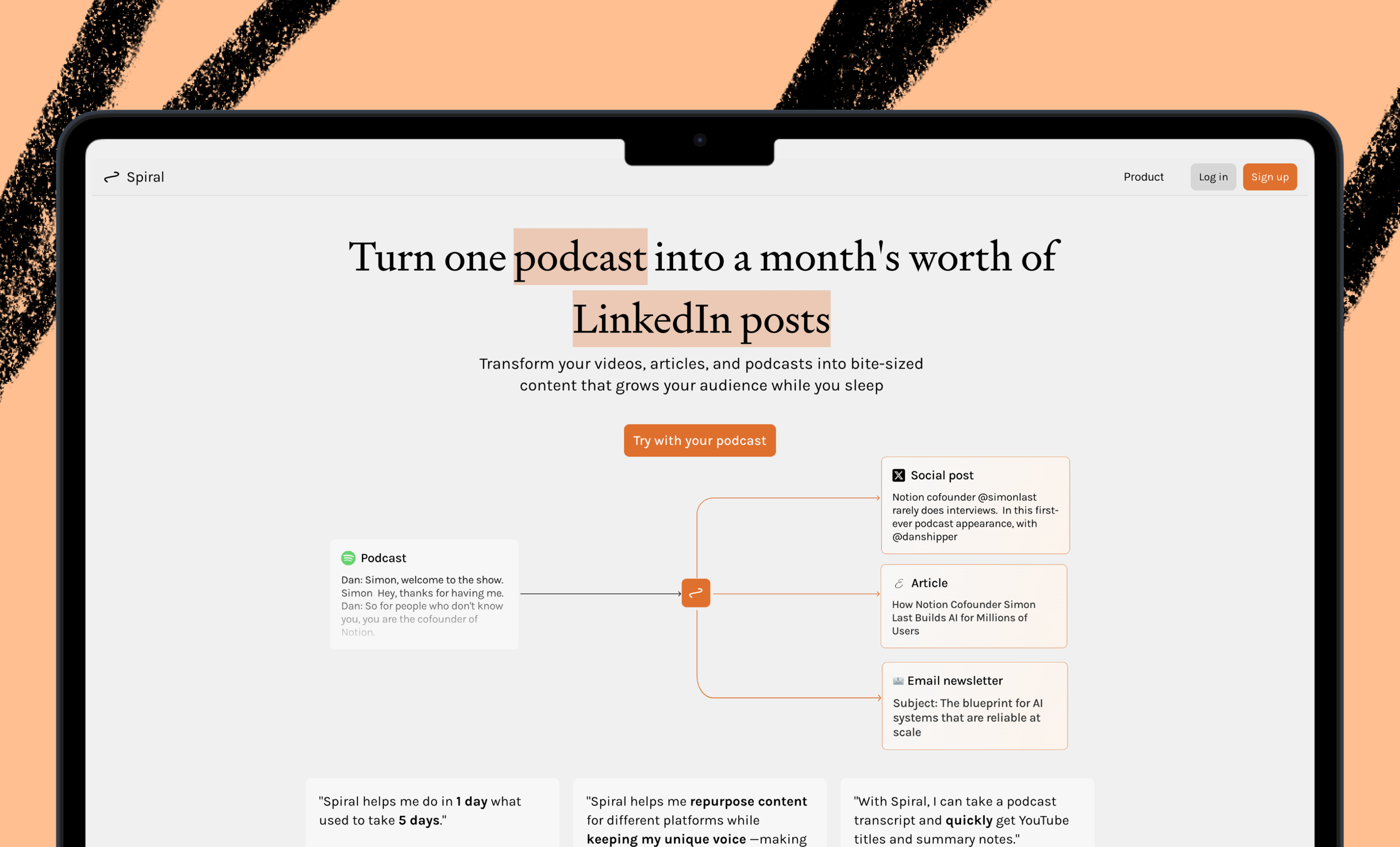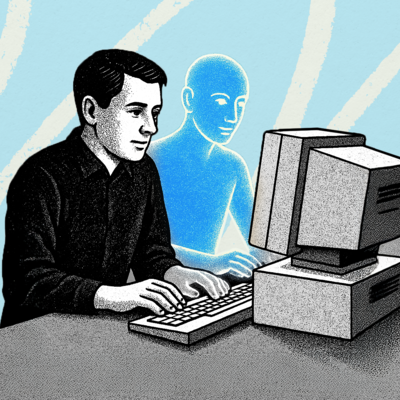
Hello, and happy Sunday! Sometimes the work we publish comes together in hours or days; at others, it takes weeks or months. This week we published a piece by Sari Azout that fell in the latter category. She shared the details of the eight-month-long process behind the finished piece in her newsletter. Read on for more on that, everything else we published this week, and our take on the latest tech and business news.—Kate Lee
Was this newsletter forwarded to you? Sign up to get it in your inbox.
Knowledge base
"The End of Productivity" by Sari Azout/Thesis: As AI takes over grunt work, success belongs to those making weird, wonderful, and authentic things. Sari Azout, founder of knowledge management tool Sublime, argues we need to ditch our obsession with doing more, faster, and embrace tools that foster deep thinking and intentional creation. Read this for a compelling vision of how to design technology that enhances our creativity, not just our output. 🔏 Paid subscribers get access to a workshop hosted by Sari on building your knowledge library for creative work.
“The Once and Future History of Knowledge Work” by Katie Parrott/Working Overtime: Ever since its emergence during the Industrial Revolution, knowledge work has evolved with technology, and it’s no different with AI. In Katie Parrott's’s debut for her new column about work and technology, she questions whether this disruption might actually help correct decades of wage inequality and restore middle-class jobs. Read this for a unique perspective on whether AI will substitute or complement knowledge work.
🔏 "When Guessing Isn't Good Enough" by Michael Taylor/Also True for Humans: LLMs can sometimes lie—RAG keeps them honest. Retrieval augmented generation (RAG) is like an open-book exam for AI. Instead of hallucinating answers, RAG helps AI tools search through documents with new context, going beyond generalized training data to surface accurate information that’s specific to you. Read this to understand how RAG works, and why it's the key to making AI more trustworthy and creative.
🔏 "Get the Best Out of AI—Without Bias” by Chris Silvestri: Like that friend who always agrees with you, sometimes AI can tell you exactly what you want to hear. In this final part of his series on using AI to perfect your marketing strategy, conversion copywriter Chris Silvestri breaks down four cognitive traps that can bias outcomes. Read this if you want to make sure your AI marketing strategy isn't just confirming what you already believe. Plus: Catch up on part 1, part 2, and part 3 of the series.
🎧🔏 "He Built a GPT Wrapper That Has Half a Million Users—And Keeps Growing" by Dan Shipper/Chain of Thought: Vicente Silveira's GPT wrapper AI PDF is thriving with 500,000 users despite predictions of doom for apps like his. How? By serving early adopters, staying lean, and leveraging AI to do more with less. On the latest episode of AI & I, Dan Shipper and Vicente discuss the advantages of small teams in the AI era and the future of human-AI collaboration. 🖥 Watch or listen to this to learn how to build profitable AI businesses without venture capital funding.—Aleena Vigoda
Fine tuning
OpenAI is officially getting into hardware, working with Broadcom and TSMC to release its first in-house chip by 2026, putting Nvidia’s market share at risk. It may also go up against Google with its own browser. And executives deleted potential evidence in its lawsuit with the New York Times—accidentally (allegedly).
Hello, and happy Sunday! Sometimes the work we publish comes together in hours or days; at others, it takes weeks or months. This week we published a piece by Sari Azout that fell in the latter category. She shared the details of the eight-month-long process behind the finished piece in her newsletter. Read on for more on that, everything else we published this week, and our take on the latest tech and business news.—Kate Lee
Was this newsletter forwarded to you? Sign up to get it in your inbox.
Knowledge base
"The End of Productivity" by Sari Azout/Thesis: As AI takes over grunt work, success belongs to those making weird, wonderful, and authentic things. Sari Azout, founder of knowledge management tool Sublime, argues we need to ditch our obsession with doing more, faster, and embrace tools that foster deep thinking and intentional creation. Read this for a compelling vision of how to design technology that enhances our creativity, not just our output. 🔏 Paid subscribers get access to a workshop hosted by Sari on building your knowledge library for creative work.
“The Once and Future History of Knowledge Work” by Katie Parrott/Working Overtime: Ever since its emergence during the Industrial Revolution, knowledge work has evolved with technology, and it’s no different with AI. In Katie Parrott's’s debut for her new column about work and technology, she questions whether this disruption might actually help correct decades of wage inequality and restore middle-class jobs. Read this for a unique perspective on whether AI will substitute or complement knowledge work.
🔏 "When Guessing Isn't Good Enough" by Michael Taylor/Also True for Humans: LLMs can sometimes lie—RAG keeps them honest. Retrieval augmented generation (RAG) is like an open-book exam for AI. Instead of hallucinating answers, RAG helps AI tools search through documents with new context, going beyond generalized training data to surface accurate information that’s specific to you. Read this to understand how RAG works, and why it's the key to making AI more trustworthy and creative.
🔏 "Get the Best Out of AI—Without Bias” by Chris Silvestri: Like that friend who always agrees with you, sometimes AI can tell you exactly what you want to hear. In this final part of his series on using AI to perfect your marketing strategy, conversion copywriter Chris Silvestri breaks down four cognitive traps that can bias outcomes. Read this if you want to make sure your AI marketing strategy isn't just confirming what you already believe. Plus: Catch up on part 1, part 2, and part 3 of the series.
🎧🔏 "He Built a GPT Wrapper That Has Half a Million Users—And Keeps Growing" by Dan Shipper/Chain of Thought: Vicente Silveira's GPT wrapper AI PDF is thriving with 500,000 users despite predictions of doom for apps like his. How? By serving early adopters, staying lean, and leveraging AI to do more with less. On the latest episode of AI & I, Dan Shipper and Vicente discuss the advantages of small teams in the AI era and the future of human-AI collaboration. 🖥 Watch or listen to this to learn how to build profitable AI businesses without venture capital funding.—Aleena Vigoda
Fine tuning
OpenAI is officially getting into hardware, working with Broadcom and TSMC to release its first in-house chip by 2026, putting Nvidia’s market share at risk. It may also go up against Google with its own browser. And executives deleted potential evidence in its lawsuit with the New York Times—accidentally (allegedly).
The U.S. Department of Justice demands that Google sell Chrome, in an attempt to bring back free market competition and break up the company’s monopoly on search. Google argues that this “unprecedented government overreach” will do more harm than good to the U.S. economy.
Pokémon Go is building IRL AI, using real-world data from millions of Pokemon hunters to develop its Large Geospatial Model (GSM), which predicts physical structures in the same way that LLMs predict text. Parent company Niantic’s goal is to service physical hardware like robotics, AR wearables, and autonomous vehicles—an emerging market for AI startups.
You can now reset your Instagram algorithm, a move Meta made to address growing safety concerns for teens. We’re watching to see if TikTok and YouTube will offer feature parity. Adam Mosseri, the head of Instagram, warns that recommendations will get worse before they get better since you’re rebuilding your algorithm from scratch.
AI is going Hollywood with Promise, an AI production studio backed by investor and former studio head Peter Chernin and Andreessen Horowitz. While text-to-video isn’t new (see: OpenAI's Sora; Adobe’s Firefly model), Promise’s distinction is its focus on long-form media, like movies and TV shows.
Defense tech funding is at an all-time high, led by weapons manufacturer Anduril. Last year, Andreessen Horowitz launched an investment arm focused on this sector, calling it “American Dynamism.” With the emergence of AI hardware startups, we’re looking out for what will be built at the overlap of AI and defense tech.
Microsoft is making multilingual meetings more efficient. Its sound-alikes voice clones translate your voice in real time: Talk in English, and be heard by your coworkers in Spanish. The company isn’t the first to get into AI translation—Meta is also piloting a translation feature for Instagram Reels.
Enterprise search company Glean is competing on search chatbots for businsesses, pitting it against Google and OpenAI in an increasingly competitive market for search.
H, an AI startup that raised $220 million without a product earlier this year, launched its first one: Runner H. Builton top of a proprietary LLM, it’s an agentic AI that automates enterprise-level tasks like workflows and quality assurance. H is releasing free APIs so developers can build their own agents or use existing ones off-the-shelf.
A Chinese AI lab releases a reasoning model that reportedly rivals OpenAI's o1. The company DeepSeek plans to open-source its model and release an API—at a time when OpenAI is underwater for its lack of transparency.—AV
Alignment
Flood the zone. On Christmas Eve in Iceland, people exchange books and spend the night reading together, accompanied by mugs of hot chocolate with marshmallows, in a tradition called Jolabokaflod. Despite its international reputation, the reality is more practical: Christmas is a prime publishing season there, and bookstores flood with new releases. But I love how the romanticized version caught on globally. There's something cozy about gifting books and carving out time for reading. This year, I'm gifting two books that changed my perspective on life:
📕 Notes from a Dead House by Fyoder Dostoevsky is not his most famous work, but it is his most honest. Written after spending four years in a Siberian prison camp, he wrote it to show how humans adapt to the darkest circumstances while maintaining their humanity.
📕 Spiritual Enlightenment: The Damnedest Thing by Jed McKenna strips away the comfortable beliefs you have about yourself. It's like rewiring your operating system. It’s not for the faint of heart, but if you're ready to question everything you know, this is your book.—Ashwin Sharma
Hallucination
We build in our own image.
Source: X/Lucas Crespo.
That’s all for this week! Be sure to follow Every on X at @every and on LinkedIn.
We also build AI tools for readers like you. Automate repeat writing with Spiral. Organize files automatically with Sparkle. Write something great with Lex.
Ideas and Apps to
Thrive in the AI Age
The essential toolkit for those shaping the future
"This might be the best value you
can get from an AI subscription."
- Jay S.
Join 100,000+ leaders, builders, and innovators

Email address
Already have an account? Sign in
What is included in a subscription?
Daily insights from AI pioneers + early access to powerful AI tools
Ideas and Apps to
Thrive in the AI Age
The essential toolkit for those shaping the future
"This might be the best value you
can get from an AI subscription."
- Jay S.
Join 100,000+ leaders, builders, and innovators

Email address
Already have an account? Sign in
What is included in a subscription?
Daily insights from AI pioneers + early access to powerful AI tools









Comments
Don't have an account? Sign up!